Science, Engineering, and Technology

Academy projects in Science, Engineering, and Technology seek to strength- en the capacity of science and engineering to improve the human condition. This goal has never been more important for the nation or for the world. Global challenges increasingly require collaboration across disciplinary, professional, and national boundaries, while rapid advances in information processing and transmission raise new issues for both the management of scientific and technical information and for the ability of individuals and institutions to assimilate and act on new discoveries.
Drawing on the broad expertise of its membership and outside experts, Academy studies in Science, Engineering, and Technology analyze the impact of advances in these areas and develop policy recommendations that are made available to government, academia, nongovernmental organizations, and the private sector. Activities focus on increasing public understanding of current research and technological change, and on helping society adapt effectively and make meaningful use of new scientific and technical knowledge. Areas of interest include U.S. productivity in science and engineering; public understanding of, and trust in, science, engineering, and medicine; and how the adoption of new technologies shapes, and is shaped by, societal values and individual and institutional decision-making.
SCIENCE, ENGINEERING, AND TECHNOLOGY
Program Advisory Group
Program Advisory Group Chairs
Alan Leshner
formerly, American Association for the Advancement of Science
Geraldine L. Richmond
University of Oregon
Program Advisory Group Members
Nancy C. Andrews
Duke University School of Medicine
Mary Beckerle
University of Utah
Arthur Bienenstock
Stanford University
Emery Brown
Massachusetts Institute of Technology; Harvard Medical School; Massachusetts General Hospital
Claude Canizares
Massachusetts Institute of Technology
Gerald Chan
The Morningside Group
David Clark
Massachusetts Institute of Technology
Wayne Clough
Georgia Institute of Technology; formerly, Smithsonian Institution
Robert Horvitz
Massachusetts Institute of Technology
Leah Jamieson
Purdue University
Cora Marrett
formerly, National Science Foundation
James Simons
Euclidean Capital
Jeannette Wing
Columbia University
PROJECT
The Public Face of Science
The Academy’s initiative on the Public Face of Science addresses various aspects of the complex and evolving relationship between scientists and the public, and examines how trust in science is shaped by individual experiences, beliefs, and engagement with science. The project is also looking at the role of science in the legal system and the coordination and deployment of scientific teams as part of crisis response. The initiative has brought together a broad range of experts in communication, law, humanities, the arts, journalism, public affairs, and the physical, social, and life sciences. While this project does not directly address scientific literacy in K-12 and adult education, it will inform such efforts by fostering a greater understanding of the public’s attitude toward science.
The first project report, Perceptions of Science in America, was published in February 2018 and summarizes the existing data on the current understanding of how Americans view science, scientists, and the impacts of scientific research. The report has been incorporated into teaching materials for university courses in science communication and outreach, and has been distributed and discussed at training workshops for science communicators. The report is being used by professional societies; governmental organizations; science advocacy groups; and the university community – including provosts, vice presidents and vice chancellors of research, science communication faculty, and public engagement specialists.
Subsequent reports will highlight the numerous ways that individuals encounter science in their everyday lives and present recommendations for improving the practice of science communication and engagement.
Project Chair
Richard Meserve
Covington & Burling LLP; formerly, Carnegie Institution for Science
Steering Group Members
Emilio Bizzi
Massachusetts Institute of Technology
Geoffrey Cowan
University of Southern California
Ellen Futter
American Museum of Natural History
Sylvester James Gates, Jr.
Brown University
Robert Hauser
American Philosophical Society
Rush D. Holt, Jr.
American Association for the Advancement of Science
Kathleen Hall Jamieson
University of Pennsylvania
Venkatesh Narayanamurti
Harvard University
Nora Newcombe
Temple University
Geneva Overholser
Formerly, The Democracy Fund; formerly, USC Annenberg School for Communication and Journalism
Kenneth Prewitt
Columbia University
Rebecca Rimel
Pew Charitable Trusts
Cristián Samper
Wildlife Conservation Society
Samuel Thier
Harvard Medical School; Massachusetts General Hospital
Project Staff
John Randell
Erica Kimmerling
Gregory Savageau
Funders
Gordon and Betty Moore Foundation
Rita Allen Foundation
Alfred P. Sloan Foundation
Project Publication \\ The Public Face of Science
Perceptions of Science in America (2018)
PROJECT MEETINGS \\ THE PUBLIC FACE OF SCIENCE
Roundtable Discussion with Academy Members on the Public Face of Science
September 11, 2017
Cornell University Ithaca, NY
Participants discussed a preliminary draft of Perceptions of Science in America and focused on the data presentations, interpretations, and takeaways. The draft was revised in response to the feedback received at the roundtable.
Featured Speaker
Diane Ackerman
Ithaca, NY
Participants
Nancy C. Andrews
Duke University School of Medicine
Barbara A. Baird
Cornell University
Jonathan Culler
Cornell University
Stephen T. Emlen
Cornell University
Thomas D. Gilovich
Cornell University
Leonard Gross
Cornell University
Martha Patricia Haynes
Cornell University
Peter Uwe Hohendahl
Cornell University
Paul Lyon Houston
Georgia Institute of Technology
Erica Kimmerling
American Academy of Arts and Sciences
Carol L. Krumhansl
Cornell University
Sidney Leibovich
Cornell University
G. Peter Lepage
Cornell University
Paul L. McEuen
Cornell University
Fred Warren McLafferty
Cornell University
Jerrold Meinwald†
Cornell University
Malden C. Nesheim
Cornell University
Don M. Randel
Ithaca, NY
John Randell
American Academy of Arts and Sciences
John D. Reppy
Cornell University
Gretchen Ritter
Cornell University
Fred B. Schneider
Cornell University
Steven H. Strogatz
Cornell University
Saul A. Teukolsky
Cornell University
Sandra L. Vehrencamp
Cornell University
Benjamin Widom
Cornell University
† Deceased
Roundtable Discussion with Academy Members on the Public Face of Science
November 1, 2017
University of Michigan Ann Arbor, MI
Following an introduction from Arthur Lupia, Academy Members discussed the final draft of Perceptions of Science in America and identified key takeaways from the report.
Featured Speaker
Arthur Lupia
University of Michigan
Participants
Hyman Bass
University of Michigan
John Carethers
University of Michigan
James Duderstadt
University of Michigan
David L. Featherman
University of Michigan
Philip Gingerich
University of Michigan
David Ginsburg
University of Michigan
Linda Gregerson
University of Michigan
James Stephen House
University of Michigan
Mary Kelley
University of Michigan
Shinobu Kitayama
University of Michigan
Juanita Merchant
University of Michigan
James Morrow
University of Michigan
John O’Shea
University of Michigan
John Randell
American Academy of Arts and Sciences
Mark Schlissel
University of Michigan
George Tsebelis
University of Michigan
Joseph Vining
University of Michigan
Marina von Neumann Whitman
University of Michigan

Roundtable Discussion with Academy Members on Perceptions of Science in America
February 14, 2018
University of Texas at Austin Austin, TX
This roundtable discussion followed the release of Perceptions of Science in America. The discussion focused on the implications of the data for the current dialogue around support for evidence-based policy and the role of scientists in communicating and engaging with the public. Insights from this discussion shaped the early outreach activities and provided context for the forthcoming project reports.
Participants
Rainer Assé
American Academy of Arts and Sciences
Allen Joseph Bard
University of Texas at Austin
Larry R. Faulkner
University of Texas at Austin
George Georgiou
University of Texas at Austin
Erica Kimmerling
American Academy of Arts and Sciences
Xiaoquin Li
University of Texas at Austin
Nicholas A. Peppas
University of Texas at Austin
John Randell
American Academy of Arts and Sciences
Michael Joseph Ryan
University of Texas at Austin
Kenneth I. Shine
University of Texas System
Roundtable Discussion on Perceptions of Science in America with MIT Knight Science Journalism and Rita Allen Science Communication Fellows
March 6, 2018
American Academy Cambridge, MA
Perceptions of Science in America was discussed in a roundtable setting with a group of professional journalists associated with the MIT Knight Science Journalism program. Following an introductory presentation by Erica Kimmerling, Hellman Fellow in Science and Technology Policy at the Academy, on the key takeaways for science writers from the report, participants discussed how the data presented in the report might influence their work as journalists. The discussion helped to shape the early outreach efforts by identifying the primary areas of interest for science journalists.
Participants
Deborah Blum
MIT Knight Science Journalism Program
Teresa Carr
Knight Science Journalism Fellow
Laura Castañón
Science Writing Graduate Student at MIT
David Corcoran
MIT Knight Science Journalism Program; Undark
Caty Enders
Knight Science Journalism Fellow
Adam Falk
Alfred P. Sloan Foundation
Jonathan F. Fanton
American Academy of Arts and Sciences
Sujata Gupta
Knight Science Journalism Fellow
Joshua Hatch
Knight Science Journalism Fellow
Rowan Jacobsen
Knight Science Journalism Fellow
Erica Kimmerling
American Academy of Arts and Sciences
Ehsan Masood
Research Fortnight
Jane Qiu
Knight Science Journalism Fellow
John Randell
American Academy of Arts and Sciences
Gregory Savageau
American Academy of Arts and Sciences
Kolawole Talabi
Knight Science Journalism Fellow
Mićo Tatalović
Knight Science Journalism Fellow
Kelsey Tsipis
Science Writing Graduate Student at MIT
Adnaan Wasey
Rita Allen Science Communication Fellow
Caroline Winter
Bloomberg Businessweek
PROJECT
The Public Face of Science: Science and the Legal System
Scientific and technological advances have increased the over- lap between scientific learning and legal issues. Yet leading scientists often express reluctance to engage with the legal system or difficulties in communicating their knowledge. Despite the importance of the issue, there are few systematic studies of how scientists view the legal system and of their experiences as consultants to lawyers or judges or as expert witnesses. The American Academy is studying these issues through a survey of its scientist members and through in-depth conversations with selected scientific and legal experts. The goal is to learn what motivates scientists to participate or to refuse to participate in legal processes and to recommend ways to improve the science-law relationship. The Fall 2018 issue of Dædalus on “Science and the Legal System” contains a series of essays by leading scientists and lawyers and a summary of the survey of Academy Members designed to understand better how scientists and engineers perceive and interact with the legal system.
Project Chairs
Shari Seidman Diamond
Northwestern University Pritzker School of Law
Richard Lempert
University of Michigan
PROJECT MEETING \\ PUBLIC FACE OF SCIENCE: SCIENCE AND THE LEGAL SYSTEM
Dædalus Authors’ Workshop on Science and the Legal System
July 20–21, 2017
American Academy Cambridge, MA
The Academy convened the Dædalus authors to review initial drafts of their essays and identify ways to share the issue effectively with the legal and scientific communities.
Participants
Huda Akil
University of Michigan
Robert Cook-Deegan
Duke Global Health Institute
Shari Seidman Diamond
Northwestern University Pritzker School of Law
Rebecca Eisenberg
University of Michigan School of Law
Nancy Gertner
Harvard Law School; United States District Court for the District of Massachusetts, ret.
Linda Greenhouse
Yale Law School
Susan Haack
University of Miami School of Law
Valerie Hans
Cornell Law School
Sheila Jasanoff
Harvard Kennedy School
Jay Kadane
Carnegie Mellon University
Erica Kimmerling
American Academy of Arts and Sciences
Richard Lempert
University of Michigan
Elizabeth Loftus
University of California, Irvine
Anne-Marie Mazza
National Academies of Sciences, Engineering, and Medicine
Jennifer Mnookin
University of California, Los Angeles School of Law
John Randell
American Academy of Arts and Sciences
Jed Rakoff
United States District Court for the Southern District of New York
Daniel Rubinfeld
University of California, Berkeley; New York University
Michael Saks
Arizona State University Sandra Day O’Connor College of Law
Joseph Sanders
University of Houston Law
Patti Saris
United States District Court for the District of Massachusetts
Keerthi Shetty
American Academy of Arts and Sciences
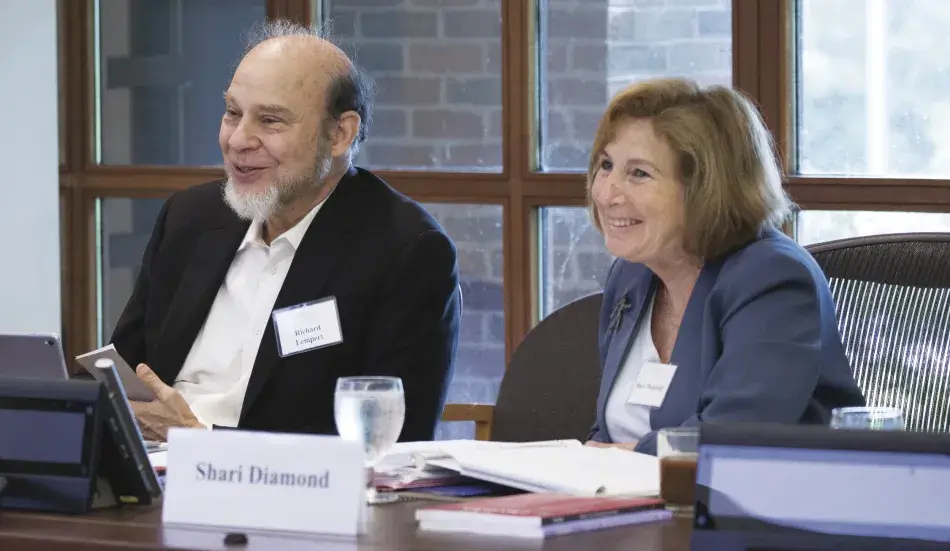
PROJECT
The Alternative Energy Future
Extensive studies of energy and climate have concluded that the energy system in the United States must undergo a substantial transformation to address economic, environmental, and geopolitical challenges. As this transformation takes place, both individuals and public- and private-sector institutions will need to adapt to the profound societal change that will accompany the adoption of new energy technologies. The Alternative Energy Future project is developing a cohesive understanding of the social and regulatory factors that can either inhibit or facilitate transformative change in the U.S. energy system. The project objectives are: 1) to demonstrate the value of social science in designing and adopting innovations in the physical energy system; and 2) to create a research program aimed at understanding how governing institutions and policy design must adapt to the demands of a changing energy infrastructure.
Building on the 2011 Academy report Beyond Technology: Strengthening Energy Policy through Social Science and two special issues of Dædalus on the Alternative Energy Future, the Academy is undertaking a two-year research project to understand better the factors that contribute to policy durability and flexibility. The study draws on lessons from the Clean Air Act (CAA), which is a prominent example of a policy that has persisted for decades while adapting continuously to new scientific, technological, and economic information. The Academy study uses five specific components of the caa as case studies to facilitate identification of crucial design attributes that promote or detract from both policy durability and flexibility and positive program outcomes. The case studies and their conclusions will be published in a forthcoming book from Cambridge University Press. The book will serve as a resource for policy-makers who seek to create effective energy policies at all levels of government, as well as for university programs in sustainability and public policy.
Project Chairs
Granger Morgan
Carnegi Mellon University
Maxine L. Savitz
Honeywell, Inc., ret.
STUDY GROUP ON DURABILITY AND ADAPTABILITY IN ENERGY POLICY
Study Group Chairs
Dallas Burtraw
Resources for the Future
Ann Carlson
University of California, Los Angeles School of Law
Study Group Members
Joseph Aldy
Harvard University
William Boyd
University of California, Los Angeles School of Law
Eric Patashnik
Brown University
Barry Rabe
University of Michigan
Hannah Wiseman
Florida State University College of Law
Project Staff
John Randell
Gregory Savageau
Funders
Alfred P. Sloan Foundation
The Kresge Foundation

PUBLICATIONS \\ THE ALTERNATIVE ENERGY FUTURE
Lessons from the Clean Air Act: Building Durability and Adaptability into U.S. Climate and Energy Policy (Cambridge University Press, forthcoming)
“The Alternative Energy Future,” vols. 1–2, Dædalus (Spring 2012 and Winter 2013)
Beyond Technology: Strengthening Energy Policy through Social Science (American Academy of Arts and Sciences, 2011)
PROJECT MEETINGS \\ THE ALTERNATIVE ENERGY FUTURE
With support from the Kresge Foundation, the Academy convened three workshops with state and municipal policy- makers and practitioners to discuss how the conclusions from the Academy study could be integrated into existing and new policies and programs. These workshops focused on three regions of the country: California, the Great Lakes, and
New England. The Academy plans to publish the proceedings from these workshops as a companion occasional paper to the forthcoming edited volume from Cambridge University Press to illustrate the potential implications of this research for subnational energy policy.
Strengthening Energy Policy in the Great Lakes Region
November 1, 2017
Gerald R. Ford School of Public Policy Ann Arbor, MI
The first of the three regional workshops organized by the Academy examined the integration of municipal and state policies in the Great Lakes region.
Participants
Joseph Aldy
Harvard Kennedy School
Janice Beecher
Michigan State University
Valerie Brader
Michigan Agency for Energy
Stephen Brooks
University of Windsor
Kathryn Buckner
Council of Great Lakes Industries
Dallas Burtraw
Resources for the Future
Liesl Clark
5 Lakes Energy
James Clift
Michigan Environmental Council
Anne Evens
Elevate Energy
Luke Forrest
Michigan Municipal League
Douglas George
Consul General of Canada in Detroit
Kristine Hartman
National Conference of State Legislatures
Catie Hausman
University of Michigan
Melissa Greene Hopfer
Lucas County Commissioner’s Office
Hoon-Yung Hopgood
Michigan Senate Environmental Quality Subcommittee of the Appropriations Committee
Chris Kolb
Michigan Environmental Council
Mary Maupin
Department of Environmental Quality, State of Michigan
Sarah Mills
University of Michigan
Matthew Naud
City of Ann Arbor, MI
Barry Rabe
University of Michigan
Daniel Raimi
Resources for the Future; University of Michigan
John Randell
American Academy of Arts and Sciences
Sean Reed
Clean Energy Coalition
Gregory Savageau
American Academy of Arts and Sciences
Andy Stocking
Principal Business Enterprises, Inc.
Frank Szollosi
National Wildlife Federation
Strengthening Energy Policy in the Northeast Region
December 4, 2017
American Academy Cambridge, MA
The second regional workshop convened by the Academy study group focused on the development and implementation of energy policy in New England.
Participants
Joseph Aldy
Harvard Kennedy School
Jacquie Ashmore
Boston University
Janet Gail Besser
Northeast Clean Energy Council
Laurie Burt
Laurie Burt LLC
Dallas Burtraw
Resources for the Future
David Cash
University of Massachusetts Boston
Robert Ethier
ISO New England
Kelly Sims Gallagher
Tufts University
Joseph Goffman
Harvard Law School
Paul Hibbard
Analysis Group
Bruce Ho
Natural Resources Defense Council
Judson Jaffe
U.S. Department of the Treasury; formerly, Analysis Group, Inc.
Barbara Kates-Garnick
Tufts University
Amelia Keyes
Resources for the Future
Kristen McCormack
Harvard University
Tom McShane
Dewey Square Group
John Randell
American Academy of Arts and Sciences
Stephen Russell
Department of Energy Resources, Commonwealth of Massachusetts
Gregory Savageau
American Academy of Arts and Sciences
Nancy L. Seidman
Regulatory Assistance Project
Dan Sosland
Acadia Center
Will Space
Massachusetts Department of Environmental Protection
Jordan Stutt
Acadia Center
Sharon Weber
Massachusetts Department of Environmental Protection
Matthew Willner
Ceres
Bryson Symposium on Climate and Energy Policy
Thursday, March 1, 2018
California Institute of Technology Pasadena, CA
The Bryson Symposium on Climate and Energy Policy drew on the diverse experiences of several California leaders in climate and energy, as well as the Academy’s research program on Durability and Adaptability in Energy Policy, to explore how new research and innovations in both public policy and scientific research are contributing to the mitigation of climate change, and how local, state, and regional action can drive progress toward national climate and energy goals.
Speakers
Dallas Burtraw
Resources for the Future
Ralph Cavanagh
NRDC
Nathan S. Lewis
California Institute of Technology
Mary Nichols
California Air Resources Board
Ronald O. Nichols
Southern California Edison
John Randell
American Academy of Arts and Sciences
Thomas F. Rosenbaum
California Institute of Technology
Maxine L. Savitz
formerly Honeywell, Inc.
Robert B. Weisenmiller
California Energy Commission
Strengthening Energy Policy in California
March 2, 2018
University of California, Los Angeles School of Law Los Angeles, CA
On March 2, 2018, the third regional workshop convened under the Academy’s study on Durability and Adaptability in Energy Policy was held in Los Angeles, California.
Participants
Eric Biber
University of California, Berkeley School of Law
William Boyd
University of Colorado Law School
Sarah Brady
California Council on Science and Technology
Dallas Burtraw
Resources for the Future
Ann Carlson
University of California, Los Angeles School of Law
Linda Cohen
University of California, Irvine School of Law
J. R. DeShazo
University of California, Los Angeles Luskin School of Public Affairs
Anthony Eggert
ClimateWorks Foundation
Ethan Elkind
University of California, Los Angeles School of Law; University of California, Berkeley School of Law
Meredith Hankins
University of California, Los Angeles School of Law
Sean Hecht
University of California, Los Angeles School of Law
Cara Horowitz
University of California, Los Angeles School of Law
Laurel Hunt
Los Angeles Regional Collaborative for Climate Action and Sustainability
Amelia Keyes
Resources for the Future
Alexandra Klass
University of Minnesota Law School
Daniel Lashof
NextGen Policy
Nathaniel Logar
University of California, Los Angeles School of Law
Amber Mace
California Council on Science and Technology
Timothy Malloy
University of California, Los Angeles School of Law
Daniel Melling
University of California, Los Angeles School of Law
Peter Miller
Natural Resources Defense Council
George Minter
Southern California Gas
Mary Nichols
California Air Resources Board
Tanya Peacock
Southern California Gas
Carla Peterman
California Public Utilities Commission
Deepak Rajagopal
University of California, Los Angeles
John Randell
American Academy of Arts and Sciences
Casandra Rauser
University of California, Los Angeles
Daniel Sanchez
American Association for the Advancement of Science
Gregory Savageau
American Academy of Arts and Sciences
Maxine Savitz
Honeywell, Inc., ret.
Adam Smith
Southern California Edison
Nancy Sutley
Los Angeles Department of Water and Power
Gerald Torres
Cornell University
David Vogel
University of California, Berkeley Haas School of Business
Alex Wang
University of California, Los Angeles School of Law
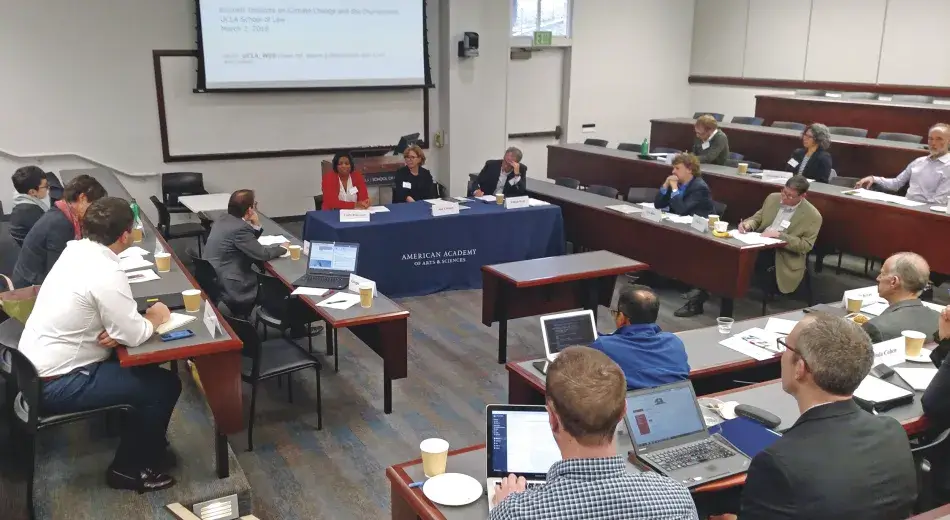
PROJECT
Challenges for International Scientific Partnerships
This project is articulating the benefits of international research collaborations and exploring solutions to ongoing challenges associated with their design and execution. The project is examining a range of types of international scientific collaborations involving university-affiliated researchers, government and international research agencies, and/or nongovernment organizations. The first phase of the project is evaluating the organizational dynamics and institutional support structures that enable successful collaboration across borders, and elaborating the key metrics and strategies to assess the success of such partnerships. The project is also highlighting evolving trends among a range of types of international research collaborations. The Academy is conducting consultations with key practitioners and policy-makers in international science to identify successful and unsuccessful case studies that could be particularly informative for the final project reports. In the second phase of the project, the Academy will establish working groups to develop recommendations and best practices for the implementation of various types of international scientific partnerships.
Project Chairs
Arthur Bienenstock
Stanford University
Peter Michelson
Stanford University
Project Steering Group
Claude Canizares
Massachusetts Institute of Technology
David Fidler
Indiana University Maurer School of Law
Matthias Hentze
European Molecular Biology Laboratory
John Hildebrand
University of Arizona
David Korn
Harvard Medical School
William Lee
Wilmer Cutler Pickering Hale and Dorr
Shirley Malcom
American Association for the Advancement of Science
Cherry Murray
Harvard University
Venkatesh Narayanamurti
Harvard University
Olufunmilayo Olopade
University of Chicago
Geraldine Richmond
University of Oregon
Vaughan Turekian
National Academies of Sciences, Engineering, and Medicine
Caroline Wagner
The Ohio State University
Project Advisor
Kerri-Ann Jones
Pew Charitable Trusts
Project Staff
John Randell
Rainer Assé
Gregory Savageau
Funders
Gordon and Betty Moore Foundation
William and Flora Hewlett Foundation
Alfred P. Sloan Foundation
PROJECT MEETINGS \\ CHALLENGES FOR INTERNATIONAL SCIENTIFIC PARTNERSHIPS
Roundtable Discussion
March 28, 2018
Georgia Institute of Technology Atlanta, GA
The first in a series of roundtable discussions that were held in Spring 2018, the Atlanta meeting convened a multidisciplinary group of Academy Members and experts in international science. The discussion characterized the current landscape of global science in terms of research collaborations that are executed across institutional borders as well as institutional and disciplinary boundaries. Participants identified key capacities and factors necessary for American researchers to succeed in the current global science landscape.
Discussion Leaders
Arthur Bienenstock
Stanford University
Peter Michelson
Stanford University
Participants
Maryam Alavi
Georgia Institute of Technology
Rafael Bras
Georgia Institute of Technology
Michael Cassidy
Georgia Research Alliance
Wayne Clough
Georgia Institute of Technology; formerly, Smithsonian Institution
James W. Curran
Emory University
Zvi Galil
Georgia Institute of Technology
Aris Georgakakos
Georgia Institute of Technology
Paul Goldbart
Georgia Institute of Technology
Seymour E. Goodman
Georgia Institute of Technology
E. Brooks Holifield
Candler School of Theology, Emory University
Kaye Husbands Fealing
Georgia Institute of Technology
Nicholas Kovacs
Georgia Institute of Technology
Robert Nerem
Georgia Institute of Technology
W. Ronald Schuchard
Emory University
Philip Wainwright
Emory University
James Weyhenmeyer
Georgia State University
Larry Young
Emory University
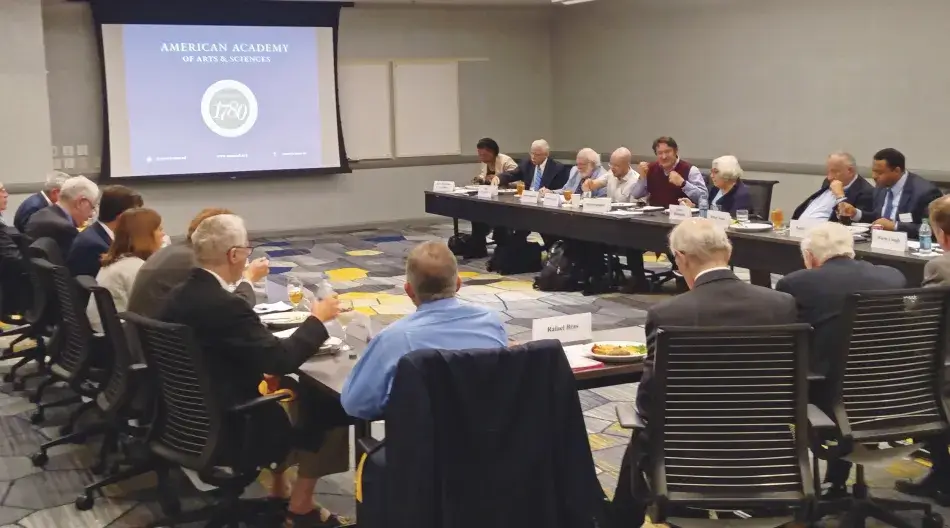
Meeting on Medical and Public Health Research
March 28, 2018
Emory University Atlanta, GA
Leaders and practitioners in global health met to discuss emerging international collaborations for research and management of communicable diseases and global pandemic threats. Participants highlighted the capacity-building and data governance models that are needed in order to create shared systems across countries for tackling these health challenges.
Participants
Rainer Assé
American Academy of Arts and Sciences
James W. Curran
Rollins School of Public Health, Emory University
Susanna Fletcher Greer
American Cancer Society
Angela Hilmers
Training Programs in Epidemiology and Public Health Interventions Network - TEPHINET
Vikas Kapil
U.S. Centers for Disease Control and Prevention
Gregory Savageau
American Academy of Arts and Sciences
Dean G. Sienko
Health Programs at the Carter Center
Serena Vinter
U.S. Centers for Disease Control and Prevention
Philip Wainwright
Emory University
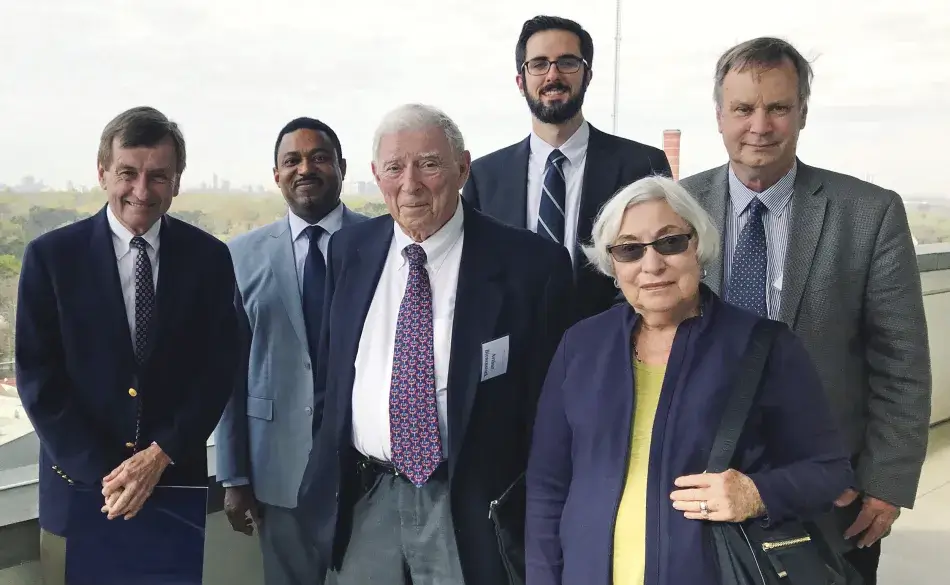
Workshop
April 25, 2018
University of Illinois at Urbana-Champaign Champaign, IL
A workshop with faculty and administrators from the University of Illinois at Urbana-Champaign highlighted international collaborations in engineering, agriculture, health, and technology at the University of Illinois. The successes and challenges of these collaborations exemplified the topics that the Academy project is addressing through case studies involving a broad range of international scientific collaborations.
Moderators
John Katzenellenbogen*
University of Illinois at Urbana-Champaign
Jeffrey Moore*
University of Illinois at Urbana-Champaign
Gene Robinson*
University of Illinois at Urbana-Champaign
Participants
Rainer Assé
American Academy of Arts and Sciences
Peter Beak
University of Illinois at Urbana-Champaign
May Berenbaum*
University of Illinois at Urbana-Champaign
Arthur Bienenstock
Stanford University
Martin Burke
University of Illinois at Urbana-Champaign
Andreas Cangellaris
University of Illinois at Urbana-Champaign
Jianjun Cheng
University of Illinois at Urbana-Champaign
W. Jerry Dávila
University of Illinois at Urbana-Champaign
Elif Ertekin
University of Illinois at Urbana-Champaign
Jonathan F. Fanton
American Academy of Arts and Sciences
Peter Goldsmith
University of Illinois at Urbana-Champaign
Robert Jones
University of Illinois at Urbana-Champaign
Anthony Leggett
University of Illinois at Urbana-Champaign
Reitu Mabokela*
University of Illinois at Urbana-Champaign
Susan Martinis
University of Illinois at Urbana-Champaign
Paul McNamara
University of Illinois at Urbana-Champaign
Peter Michelson
Stanford University
Ralph Nuzzo
University of Illinois at Urbana-Champaign
Don Ort
University of Illinois at Urbana-Champaign
John Randell
American Academy of Arts and Sciences
Jay Roloff
University of Illinois at Urbana-Champaign
Gregory Savageau
American Academy of Arts and Sciences
Petros Sofronis
University of Illinois at Urbana-Champaign
Monica Uddin
University of Illinois at Urbana-Champaign
Alex Winter-Nelson
University of Illinois at Urbana-Champaign
Martin Wong
University of Illinois at Urbana-Champaign
*Planning Committee Members
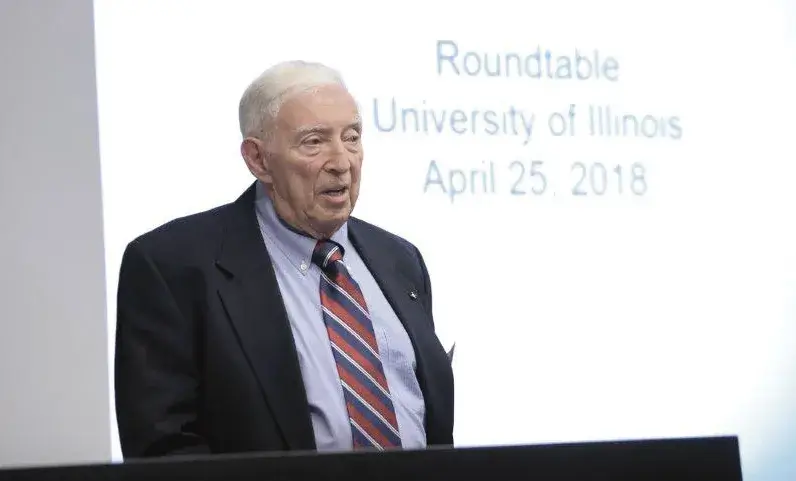
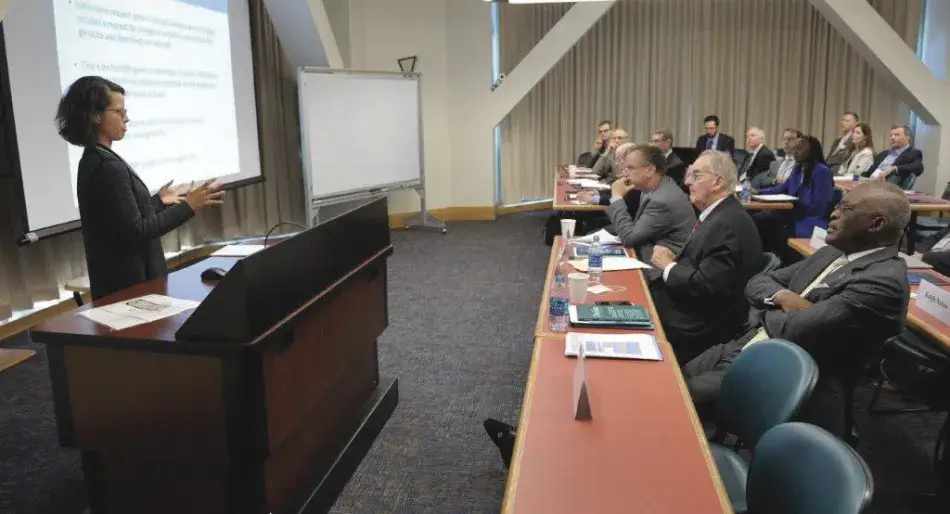
Roundtable Discussion
April 26, 2018
Rice University Houston, TX
A group of Academy Members and other experts discussed American leadership in global science as well as the value of international scientific collaborations as a vehicle for improving diplomatic relations among participating countries. Drawing on historical perspectives, international collaborations in space science and biomedical science were presented as models of how high-quality science can contribute to diplomacy.
Discussion Leaders
Arthur Bienenstock
Stanford University
Peter Michelson
Stanford University
Participants
David Alexander
Rice University
Rainer Assé
American Academy of Arts and Sciences
Robert Curl
Rice University
Edward Djerejian
Rice University
Ethan Dmitrovsky
National Institute of Health
Kenny Evans
Rice University
Martin Gruebele
University of Illinois at Urbana-Champaign
Neal Lane
Rice University
David Leebron
Rice University
Kirstin Matthews
Rice University
Ricardo Quninonez
Bayor College of Medicine
John Randell
American Academy of Arts and Sciences
Peter Rossky
Rice University
Gregory Savageau
American Academy of Arts and Sciences
Geeta Singhal
Bayor College of Medicine
Pol Spanos
Rice University
Roundtable Discussion
June 18, 2018
Massachusetts Institute of Technology Cambridge, MA
This meeting brought together leaders in the physical and life sciences to discuss the changing landscape of global science. Participants highlighted the factors that are driving this change as well as policies that would serve to better support international collaborations and science diplomacy.
Discussion Leaders
Arthur Bienenstock
Stanford University
Peter Michelson
Stanford University
Participants
Rainer Assé
American Academy of Arts and Sciences
Duane Boning
Massachusetts Institute of Technology
Claude Canizares
Massachusetts Institute of Technology
Bruno Coppi
Massachusetts Institute of Technology
Nina Dudnik
Seeding Labs
Merton Flemings
Massachusetts Institute of Technology
Edward Hackett
Brandeis University
Linden Hu
Tufts University School of Medicine
Steven Hyman
The Broad Institute
Daniel Kleppner
Massachusetts Institute of Technology
David Korn
Harvard Medical School
David Latham
Harvard University
Venkatesh Narayanamurti
Harvard University
John Randell
American Academy of Arts and Sciences
Orit Rozenblatt-Rosen
The Broad Institute
Gregory Savageau
American Academy of Arts and Sciences
Diane Souvaine
Tufts University
Anne Stevenson
Harvard T.H. Chan School of Public Health; The Broad Institute
Kevin Struhl
Harvard Medical School
Bruce Tidor
Massachusetts Institute of Technology
Krystyn Van Vliet
Massachusetts Institute of Technology
Sarah White
The Multi-Regional Clinical Trials Center of Brigham and Women’s Hospital and Harvard